Key takeaways:
- Prenatal vitamins, particularly folate, iron, calcium, and DHA, are essential for maternal and fetal health, preventing birth defects and supporting development.
- Choosing the right prenatal vitamin involves researching ingredients and dosages, with attention to personal dietary needs and potential side effects.
- Establishing a consistent routine for taking vitamins, alongside hydration and healthy meals, can significantly enhance well-being and reduce side effects during pregnancy.
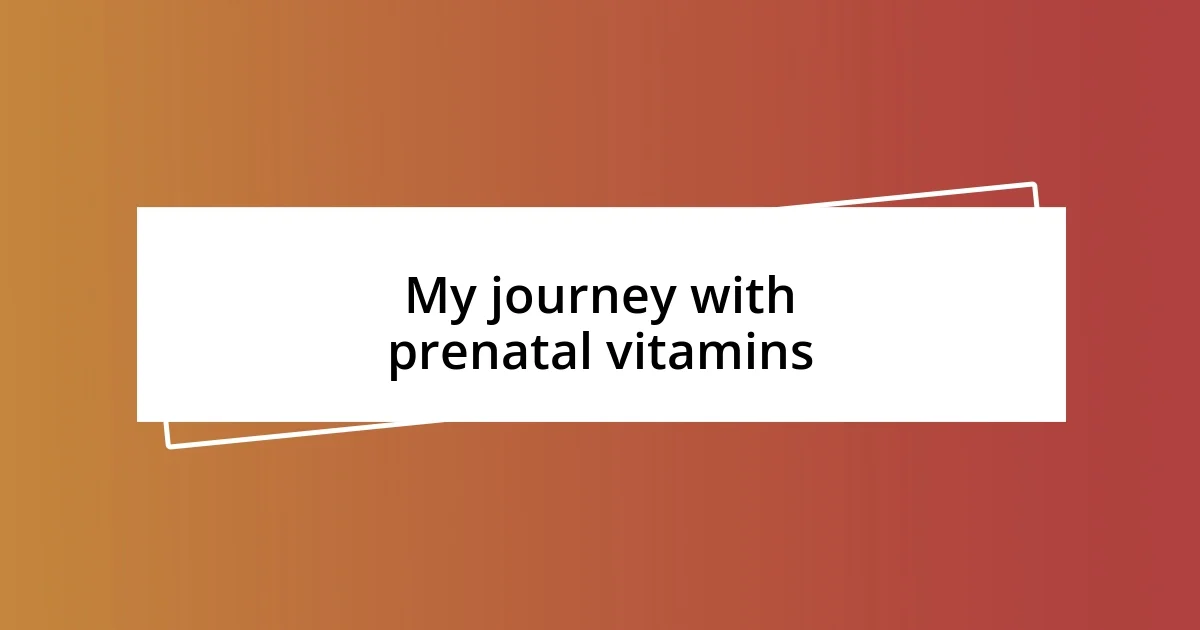
My journey with prenatal vitamins
Navigating my journey with prenatal vitamins was both a revelation and a bit of a puzzle. I still remember the day I stood in the supplement aisle, overwhelmed by the multitude of options. With so many choices, I couldn’t help but wonder—how do I know which one is right for me?
As I began taking my chosen prenatal vitamins, I felt an immediate sense of commitment to my growing baby. Each morning, I turned the routine into a little ritual, almost like a moment of connection with my child. It made me think: could these small capsules truly be making a difference in my baby’s development?
Over time, I noticed changes in my energy levels that I hadn’t expected. I felt more vibrant, and it was as if I could tackle the day with renewed vigor. Reflecting on that experience, I can see how vital those nutrients were—not just for my baby’s health but for my overall well-being during pregnancy. The journey taught me that sometimes, even the simplest actions can have a profound impact.
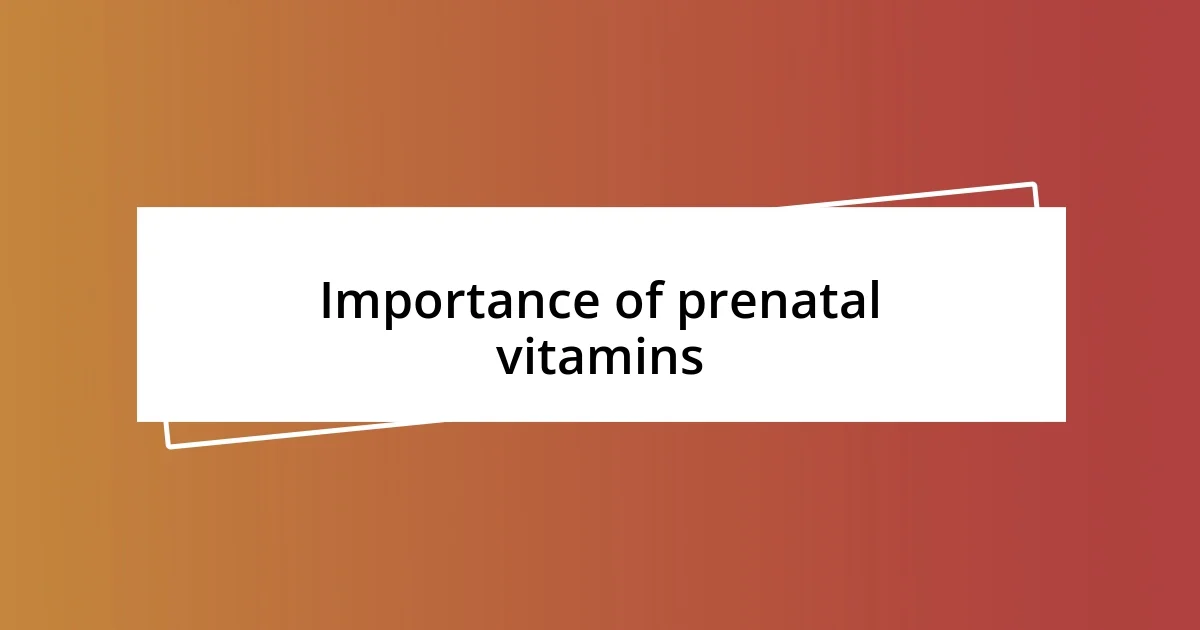
Importance of prenatal vitamins
Prenatal vitamins play a crucial role in supporting both maternal and fetal health during pregnancy. As I progressed through my journey, I realized that these vitamins aren’t just a supplement; they are a lifeline for the developing baby. Folate, iron, calcium, and DHA are especially critical, helping to prevent neural tube defects and ensuring proper brain development. This was a realization that deepened my commitment as I pictured all the things I was nurturing within.
Here are some key reasons why prenatal vitamins are important:
- Folate: Essential for preventing serious birth defects of the brain and spine.
- Iron: Helps support the increased blood volume and prevents anemia, keeping energy levels stable.
- Calcium: Vital for building the baby’s bones and teeth, while also preserving the mother’s bone density.
- DHA: An omega-3 fatty acid that plays a pivotal role in brain health and development.
- Vitamins A, C, D, and E: Contribute to the overall growth and immune function of the fetus.
In my own experience, the act of taking these vitamins became a daily affirmation of my role as a mother. I would think about the tiny life growing within me as I swallowed each pill, feeling a sense of purpose that resonated deeply. It’s fascinating how such small commitments can foster a profound sense of connection and responsibility toward the new life I was bringing into the world.
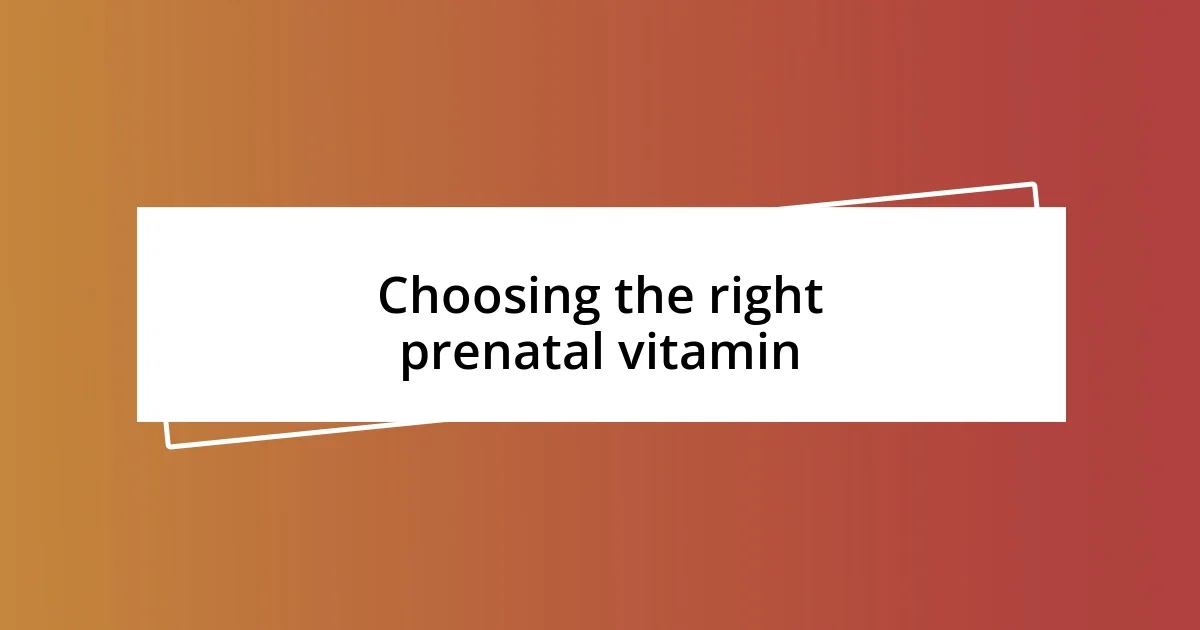
Choosing the right prenatal vitamin
Choosing the right prenatal vitamin is more than just picking a bottle off the shelf—it’s about understanding what your body and your baby truly need. I remember the first time I dove into researching ingredients. It wasn’t just a checklist; it felt like a treasure hunt for the right combination of nutrients that could support my pregnancy. I learned that not all prenatal vitamins are created equal; some are lacking in essential components, while others offered a well-rounded formula tailored for expectant mothers.
While many options boast an extensive list of beneficial ingredients, I found it crucial to pay attention to dosages as well. For instance, not all forms of iron are easy to digest. I recall choosing a prenatal that had a gentler variant, which made a world of difference for my stomach and energy levels. It is essential to consider your specific dietary needs and consult a healthcare provider to find what complements your lifestyle and health goals best.
Nutritional needs can vary significantly from one woman to another. For me, ensuring the inclusion of DHA was paramount, as I wanted to support my baby’s brain development. I often shared my findings with friends who were pregnant as well, initiating conversations about what worked for each of us. It was comforting to realize that while we each had our preferences, we were all striving for the same well-being for our little ones.
| Vitamin | Benefits |
|---|---|
| Folate | Prevents neural tube defects |
| Iron | Supports increased blood volume, prevents anemia |
| Calcium | Essential for baby’s bones and teeth |
| DHA | Critical for brain health and development |
| Vitamins A, C, D, E | Contribute to overall growth and immune function |
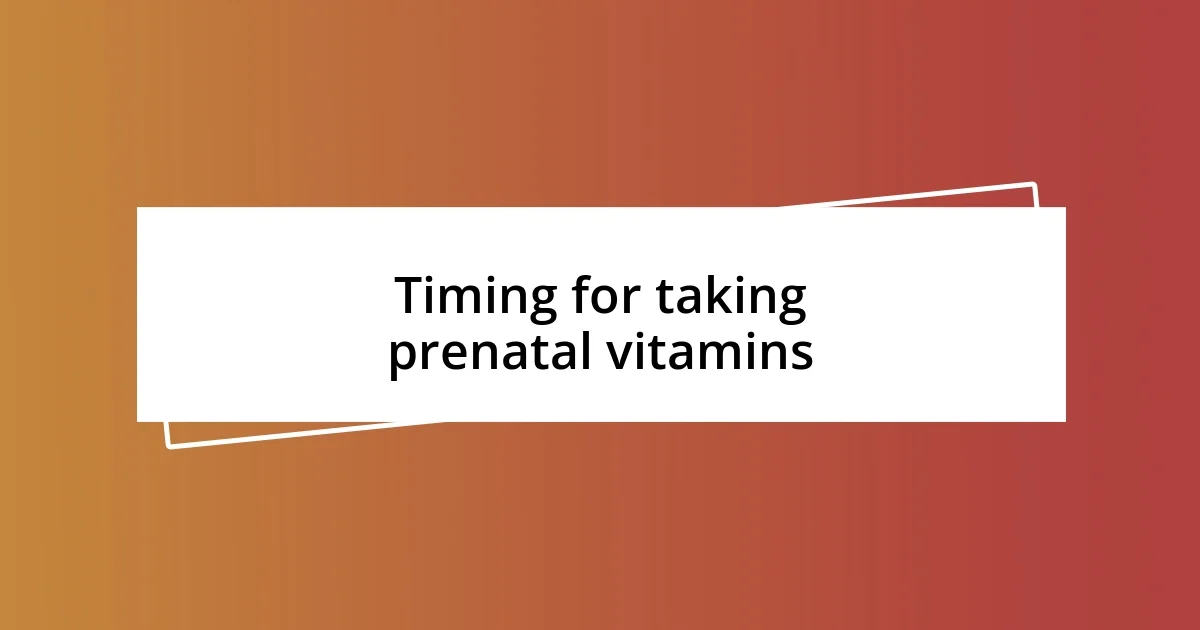
Timing for taking prenatal vitamins
Finding the right timing for taking prenatal vitamins was a pivotal part of my routine. Initially, I took them whenever I remembered, which became a bit hit-or-miss. It wasn’t until I established a consistent time—usually alongside breakfast—that I noticed a positive shift in how I remembered to take them daily. Have you ever noticed how pairing a task with something else familiar can establish a comforting habit? That’s precisely what I experienced—it transformed into an automatic part of my morning.
I also discovered that taking these vitamins at night didn’t sit well with my stomach. Some days, I would wake up feeling uneasy, which made me question whether it was the vitamins or something else. After a little experimenting, I shifted back to my morning routine and immediately felt a difference. Listening to your body is so essential during this time. Have you ever considered how these small adjustments can lead to significant improvements? It’s remarkable how such a simple change can impact your overall well-being.
Timing can also be influenced by your prenatal vitamin type. For instance, some women find that chewable vitamins or gummies are tastier and easier to digest, making them a morning treat. I vividly remember when a friend mentioned her love for chocolate-flavored gummies; this not only made her morning routine enjoyable but also helped her stay on track. The emotional boost from savoring something delicious can’t be underestimated. Isn’t it comforting to think about how tiny choices, like when and how we take our vitamins, can bring us a little joy during such a transformative journey?
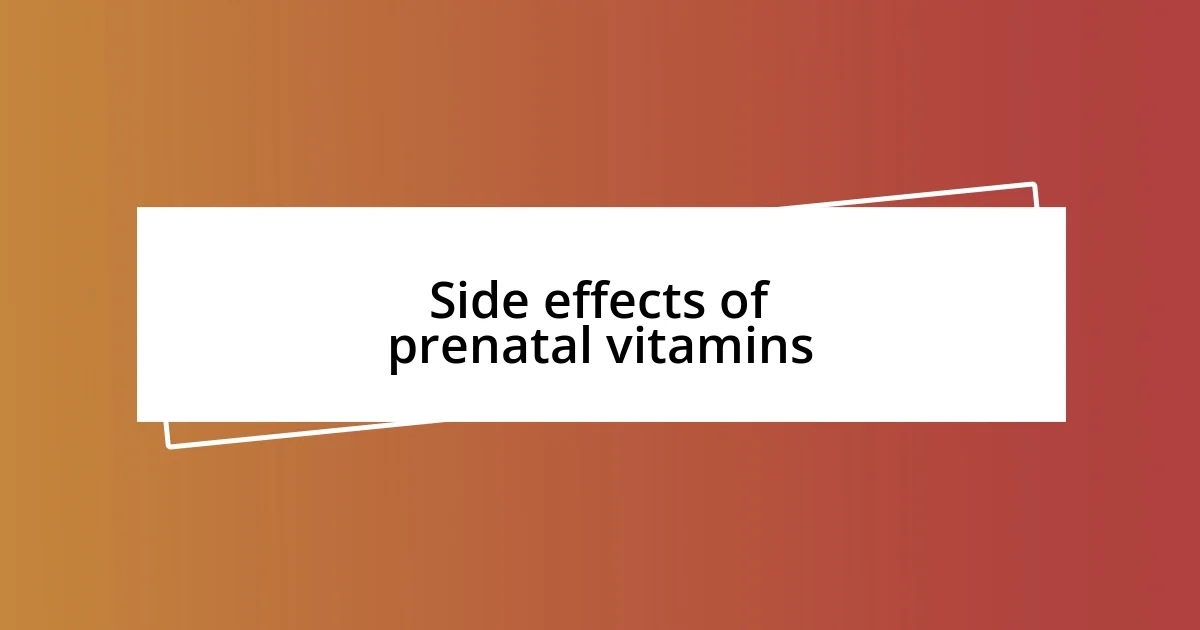
Side effects of prenatal vitamins
One of the surprising aspects I encountered while taking prenatal vitamins was their potential side effects. Initially, I was dedicated to making sure I was giving my baby the best by adhering to my supplement schedule. But then, I started to experience some uncomfortable gastrointestinal issues—think nausea and bloating. Has that ever happened to you? It made me reevaluate my choices and led me to discover that certain ingredients in my vitamins might not be as friendly to my stomach as I had hoped.
As I delved deeper, I found out that iron, especially in higher doses, could be a culprit in many women’s experiences with morning sickness. This information struck a chord with me because I had been feeling unwell and didn’t connect the dots at first. After consulting with my healthcare provider, I learned that switching to a prenatal vitamin with a gentler form of iron helped alleviate my discomfort. So, if you’re facing similar struggles, don’t hesitate to explore alternatives and listen to your body.
I also noticed that some prenatal vitamins caused mild headaches, a side effect that I definitely didn’t see coming. Upon reflection, I realized that it might have resulted from taking them on an empty stomach. In my experience, this highlighted the importance of observing how our bodies react to various supplements. Have you ever considered how something as small as taking your vitamins after a meal could change your experience? It’s essential to find a routine that not only supports your pregnancy but feels good for you, too.

Benefits I experienced
Taking prenatal vitamins brought a sense of reassurance that I was doing my best for my growing baby. Once I got into a consistent routine, I felt more energized, which made a noticeable difference in my day-to-day life. Have you ever felt that special kind of uplift from knowing you’re investing in your well-being? For me, it served as a reminder that I was nurturing something beautiful, and that alone boosted my mood.
Another significant benefit I experienced was my improved skin condition. During my pregnancy, I often dealt with unexpected breakouts and dryness, but I began to notice my skin looking healthier shortly after I started my prenatal regimen. It was like a glow-up that complemented the joyful changes happening in my body. Have you ever noticed how your skin can reflect what you put inside? That subtle glow became a source of confidence for me during a time when my body was going through so many transformations.
Moreover, I found that the consistency of my vitamins helped ease my anxiety about nutrition. With so many recommendations floating around, I used to feel overwhelmed about what I should eat. Knowing that I was getting essential nutrients like folic acid and DHA through my vitamins gave me peace of mind. It was a relief to focus less on the specifics of my diet and more on enjoying the experience of pregnancy. Isn’t it empowering to know that a simple daily routine can bolster not just your physical health but your mental well-being too?
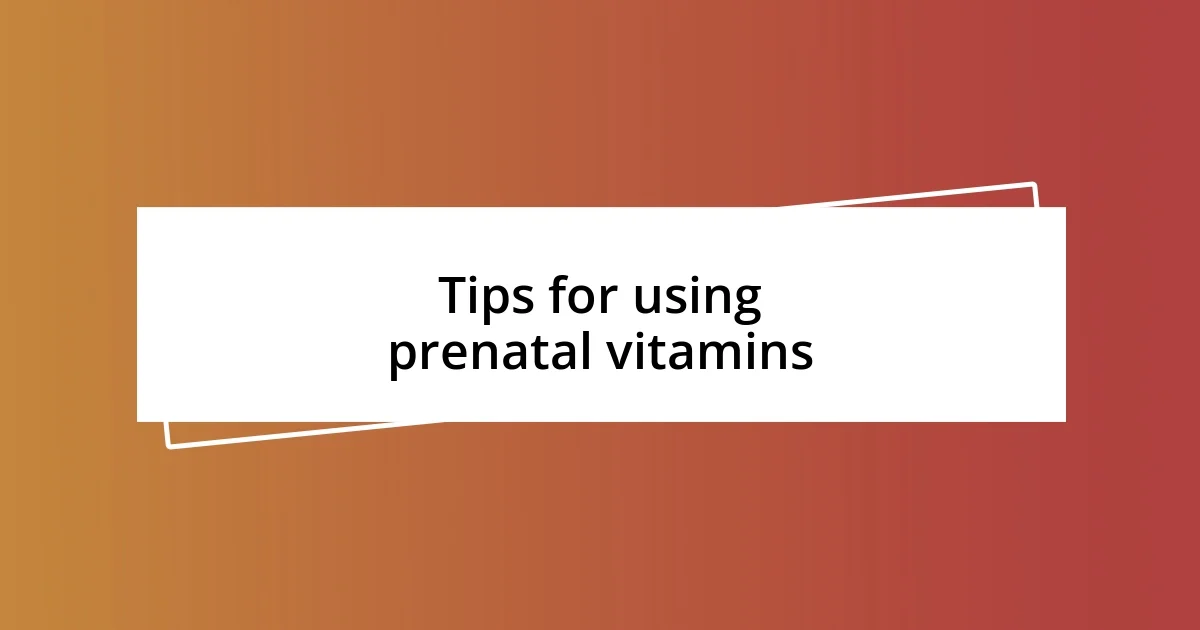
Tips for using prenatal vitamins
When using prenatal vitamins, timing can make a world of difference. I found that taking my vitamins in the evening, right before bed, minimized any stomach discomfort I experienced during the day. Have you considered how your routine could impact how you feel? A simple shift in timing might be the solution you didn’t know you were searching for.
Another tip I discovered is to pair your prenatal vitamins with a meal that includes healthy fats. This not only aids absorption but also seemed to reduce any lingering nausea I associated with the vitamins. I remember one night, I sautéed some veggies in coconut oil and took my vitamins right afterward. It was a game-changer! What meals have you enjoyed that might complement your vitamin routine?
Lastly, keep an eye on your hydration levels. I noticed that staying well-hydrated helped mitigate some of the side effects I faced. When I was diligent about drinking enough water, it seemed to ease any headaches and bloating I had previously experienced. Have you ever considered how hydration impacts your overall well-being? It’s a subtle but crucial piece of the puzzle when you’re focused on nurturing both your body and your baby.













